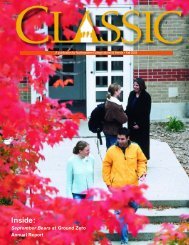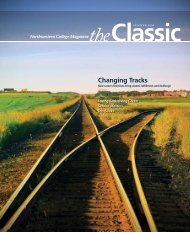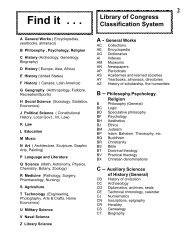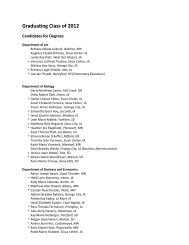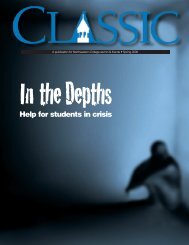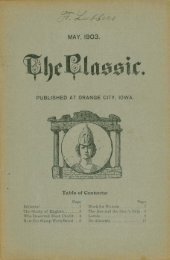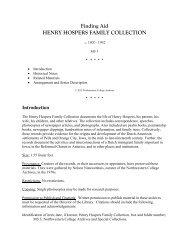Summer 2010 - Northwestern College
Summer 2010 - Northwestern College
Summer 2010 - Northwestern College
- No tags were found...
You also want an ePaper? Increase the reach of your titles
YUMPU automatically turns print PDFs into web optimized ePapers that Google loves.
COVER STORYCOVER STORYschool and college and is there this summer on a 10-week internshipwith Lifeline Christian Mission in Grand Goave, Haiti.“The first couple of weeks were really hard for me because I wantedto be there so badly,” she says of the earthquake. “I don’t think I’ve everprayed to God without ceasing that much before. It was constantly onmy mind and heart.”Because of her experience in Haiti, Earleywine was asked to speak atvarious fundraisers, where she answered people’s questions about howthey could give to—and pray for—Haiti. “I think God used me hereduring that time to be more of a benefit to Haiti than I could have beenif I was there,” she says.The earthquake also spurred an increased interest in adopting childrenfrom Haiti. Even before the quake, the country had 380,000 orphans—anumber that likely grew by tens of thousands as a result of lives claimedby the disaster. After the quake, the U.S. and Haiti worked together toensure orphans who had been matched with Americans for adoptionbefore the earthquake received the care they needed. Humanitarianparole granted by the U.S. Immigration Services allowed nearly 500orphans to enter the United States the week of Jan. 18.Sara (Cleveringa ’00) Van Zee and her husband, Tim, had begun theprocess of adopting a child from Haiti in the fall of 2009. The OrangeCity couple felt called to adopt shortly after their marriage when theysaw children living in poverty during a mission trip to Nicaragua.Matched with 1-year-old Albear, the Van Zees were relieved tolearn the orphanage he was in 90 miles north of Port-au-Prince wasuntouched by the quake. But their hopes for a speedy union with theirson were dashed by the arrest of 10 American missionaries who wereattempting to take children out of the country without the properpaperwork.All processing of orphans stopped while Haiti changed its procedures,requiring the prime minister to sign every child’s paperwork and for allchildren to fly out of Port-au-Prince.“I don’t know what their hearts were,” Sara says of the missionaries,“but I do know that when children and countries are involved, whateveryour motivation is, you need to do things the right way. It’s justfrustrating because you think, ‘If you really care about kids, do it soeverybody can continue in this process.’”When it was finally Albear’s turn to travel to the U.S., however, therewere more problems. Haitian police at the airport refused to believe histravel papers were legitimate, and his American escorts were detainedwhile Albear and five other children were taken and placed in a tent city.Four harrowing days later, the Haitian government finally confirmedthe paperwork was legitimate, and in a story covered by CNN, thechildren were reunited with their American escorts and flown to Miami,where their new parents awaited them.As the Van Zees fielded questions from reporters, Sara told them thatwhile Albear now has a home, there are thousands of children in thatsame situation who have no hope. “It was worth it if this helps direct thelight back on those children—if we can get them help and people can seethis is not OK for a child to live like that,” she said.Like Sara, the Mompremiers see good coming out of the disaster.On the one-month anniversary of the earthquake, Haitiangovernment officials canceled the annual three-day Carnivalfestival and instead called for three days of national prayer.So far this year, JeanJean has baptized more people than in all theprevious years of the Mompremiers’ time in Haiti combined.“There is something about having the very foundations of the earthshake under your feet that makesyou realize how we depend on thetemporal instead of the EternalOne,” says Kristie. “I think theearthquake shook up the land, butit also shook up people’s faith.”The Mompremiers have seenfirsthand the difference Godcan make. Voodoo was a majorinfluence in Caiman when theyarrived, but the communityhas undergone a radicaltransformation. Where once therewere Voodoo drums at night,now there is singing about Jesus.Where there was jealousy andsuspicion, now there are peopleworking together. Neighbors arehelping neighbors in the process ofreplacing unsanitary dirt floors with poured cement.“This wouldn’t have been the case even six years ago before thegospel was bought here,” Kristie says. “There would have been peoplesabotaging work sites and theft of materials. Truly, God’s love changespeople’s hearts.”“We believe God is the only answer to Haiti’s problems,” addsJeanJean. “Without people in the government and other leadershippositions that truly care for the people and not just about lining theirown pockets or advancing their power, there can be no progress.”Although Haiti is now fading from the headlines, the crisis continues.People lack shelter. Disease runs rampant. The injured still needtreatment.Because of his connections in Haiti, Den Hartog has beencommissioned by the American Orthopedic Foot and Ankle Society tomake arrangements for teams of orthopedic surgeons to travel to Haiti.“There’s no shortage of volunteers,” he says of the waiting list of600 of his peers willing to travel to Haiti. “People are still interested inhelping. They just need to plug in with somebody who has a plan.” InApril, Den Hartog spent a week in Haiti, providing medical treatmentand working out the logistics for such teams. In two to four months hewill return with a group of surgeons to conduct reconstructive foot andankle surgeries and train Haitian orthopedists.Both Den Hartog and the Mompremiers, however, stress thathumanitarian aid is not enough. Prayer, they agree, is the most importantway to help Haiti. As for financial support, Den Hartog encouragespeople to give to organizations “not just worried about saving lives, butsaving souls.”“We have seen many great projects that are here for a short timeand then collapse,” echoes Kristie. “We see Christian missions soconcentrated on humanitarian acts that they forget to share the gospel ofChrist. Without Christ, hearts can’t be changed and all the good deedsin the world will not last.”<strong>Northwestern</strong> RespondsIn the days following the Haiti earthquake, Lindsey Geels foundherself in a conversation with a professor and fellow student aboutwhat the <strong>Northwestern</strong> community could do. There were specialtimes of prayer set aside for Haiti, but she wanted to put herprayers into action. Searching for a way to help, the freshman fromSheldon, Iowa, decided to design and sell T-shirts as a fundraiser.“God just put this idea on my heart. Not only could we raisemoney for Haiti, but it was also a way to show support for them,”she said. “And the T-shirts would be a good reminder for people topray.”Donors were found to fund the cost of producing the black shirtsfeaturing the words “Hope for Haiti” and the Bible reference ofRomans 12:12–13. A local high school used the design for a similarfundraiser, and together the two schools sold more than 700 T-shirts.Drew Nonnemacher, an Orange City junior who participated inthe college’s chapter of International Justice Mission, organizeda “Blackout for Haiti” event during a home basketball game.Students were asked to wear their Haiti T-shirts to the game, andNonnemacher found local businesses to sponsor a basketballshooting competition at halftime, with all proceeds going to Haiti.$3,800$1,20055,000Amount raised through T-shirt sales and the basketballgame fundraiser. The money was given to Promisefor Haiti, an organization located in Pignon, Haiti,which used the funds for medical supplies; fuel forhospital generators; and food, clothing and shelter forearthquake refugees.Amount the <strong>Northwestern</strong> community donated for Haitiin the days following the quake. A portion of the moneywas used to buy supplies for relief kits assembled bythe women of Stegenga Hall. The kits and remainingmoney were sent to Church World Service.Number of meals for Haitians assembled by morethan 200 students, faculty and staff during two foodpackaging events held in February and April. Thebaseball team raised $3,000 and Pizza Ranch donated$1,500 to help fund the meals, which were provided tothe organization Kids Against Hunger by NWC’s Hunger/Homeless Ministry.After being involved in six short-term mission trips toHaiti, Sarah Earleywine ’10 was asked to speak at severalevents in which funds were raised for earthquake relief.28 SUMMER <strong>2010</strong><strong>Northwestern</strong> Classic 29



